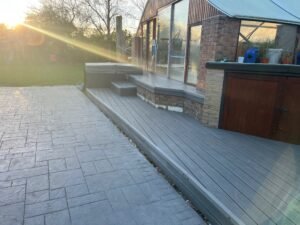Introduction: Understanding Composite Decking and its Benefits
Composite deck is a popular choice for homeowners looking to enhance their outdoor spaces. It is a man-made material that combines wood fibres and recycled plastic, offering a durable and low-maintenance alternative to traditional wood decking. In recent years, composite decking has gained significant popularity due to its numerous benefits.
Beautiful Composite Decking in Meols, Wirral.

One of the key advantages of plastic decking is its durability. Unlike traditional wood decking, composite boards are resistant to rot, warping, and splintering. This makes them ideal for areas with high moisture levels or extreme weather conditions. In fact, many manufacturers offer warranties of up to 25 years, ensuring that your deck will withstand the test of time.
Another major benefit of composite decking is its low maintenance requirements. Unlike wood decking, which requires regular staining, sealing, and sanding, composite boards only need occasional cleaning with soap and water. This saves homeowners both time and money in the long run, as they can spend more time enjoying their outdoor space rather than maintaining it.
Additionally, composite is an eco-friendly choice. By using recycled materials such as plastic and wood fibers, composite boards help reduce the demand for virgin timber and plastic. This not only conserves natural resources but also prevents waste from ending up in landfills. Furthermore, many composite decking products are made using sustainable manufacturing processes, further reducing their environmental impact.
Pros Durability, Low Maintenance, and Eco-Friendly
The durability of composite decking is one of its most significant advantages. Traditional wood decking is prone to rotting, warping, and splintering over time, especially when exposed to moisture and extreme weather conditions. Composite boards, on the other hand, are designed to withstand these challenges. They are resistant to moisture, insects, and UV rays, ensuring that your deck will remain in excellent condition for years to come.
In addition to its durability, composite decking requires minimal maintenance. Unlike wood decking, which needs regular staining, sealing, and sanding to maintain its appearance, composite boards only need occasional cleaning with soap and water. This saves homeowners both time and money, as they can spend more time enjoying their outdoor space rather than maintaining it.
Furthermore, composite decking is an eco-friendly choice. By using recycled materials such as plastic and wood fibers, composite boards help reduce the demand for virgin timber and plastic. This not only conserves natural resources but also prevents waste from ending up in landfills. Additionally, many composite decking products are made using sustainable manufacturing processes, further reducing their environmental impact.
Higher Initial Cost.
One of the main drawbacks of composite decking is its higher initial cost compared to traditional wood decking. While the upfront investment may be higher, it is important to consider the long-term savings in maintenance and replacement costs. Composite boards are designed to last for decades, whereas wood decking may require frequent repairs and replacements. Therefore, the higher initial cost of composite decking can be seen as a worthwhile investment in the durability and longevity of your outdoor space.
Composite Decking Wirral.
Another potential drawback of composite decking is the limited colour options available. While manufacturers offer a wide range of colours and finishes, they may not be able to perfectly replicate the natural look and feel of wood. Some homeowners prefer the authentic appearance of real wood, and composite decking may not meet their aesthetic preferences. However, it is worth noting that composite boards have come a long way in terms of mimicking the look of wood, and many homeowners find the available options to be visually appealing.
Lastly, composite decking has been known to retain more heat than traditional wood decking. This can be a concern in areas with hot climates, as the surface of the deck may become uncomfortably hot to walk on barefoot. However, this issue can be mitigated by choosing lighter-colored composite boards or using rugs and mats to provide insulation. Additionally, some manufacturers offer composite decking with built-in heat-reflective technology, which helps reduce heat absorption.
Conclusion: Making an Informed Decision on Composite Deck Area for Your Outdoor Space
Composite decks offer numerous benefits, including durability, low maintenance, and eco-friendliness. Its resistance to rot, warping, and splintering makes it a durable choice for outdoor spaces, while its low maintenance requirements save homeowners time and money. Additionally, composite decking helps reduce the demand for virgin timber and plastic, making it an eco-friendly option.
However, it is important to consider the potential drawbacks of composite decks before making a decision. The higher initial cost may deter some homeowners, but it is important to weigh this against the long-term savings in maintenance and replacement costs. The limited colour options may also be a consideration for those who prefer the authentic look of real wood. Lastly, the heat retention of composite decking may be a concern in hot climates, but there are ways to mitigate this issue.
Ultimately, the decision to choose composite decking for your outdoor space should be based on your specific needs and preferences. By understanding the pros and cons of composite decking, you can make an informed decision that will enhance the beauty and functionality of your outdoor living area.


Reallу when someone doesn’t understand then its up to other users that they wіll assist, so here it happens.